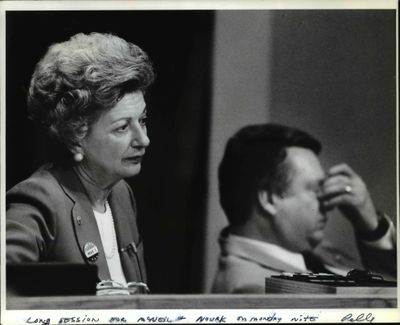Spin control: First woman mayor in Seattle in 91 years? Ho hum.

Some of the political cognoscenti of Seattle are all a-twitter that their city will have a woman mayor next year. The first in 91 years.
This is a foregone conclusion, as the top four finishers in Tuesday’s primary are women. It looks like former U.S. Attorney Jenny Durkan vs. urban planner Cary Moon in the general, although King County is still counting ballots.
Those of us who love to tweak the state’s great urban bastion of progressivism shouldn’t pull a muscle stifling a yawn. Welcome to the 1980s, Spokane-style. We had an all-woman general election for mayor in 1985, when Vicki McNeill ran against Margaret Leonard, two women who were about as different as a political pundit could imagine.
A business conservative with downtown backing versus a neighborhood populist who was a generation ahead of the Tea Party. McNeill won and might’ve managed re-election, but stepped away. We didn’t know it at the time, but she had cancer.
Sheri Barnard, who had some of McNeill’s business backing and some neighborhood support like Leonard, at least in the beginning, served the next four years. During the campaign, she seemed so likely to win election that a consultant for her opponent circulated a memo on how to defeat a woman candidate.
Of course it was leaked to the press. It didn’t go over particularly well.
When Barnard became the fourth mayor in a row to leave after a single term – forced out in the primary – folks started talking about the one-term course.
While one-termitis would strike the next five mayors – including Mary Verner, Spokane’s third woman to hold the office – it was a different set of circumstances in each case, not a single cause. The fault lies not in our stars but in ourselves, as Cassius might say.
One thing we can say about Spokane is we treated our female mayors no better and no worse than our male mayors for more than four decades. We were equal opportunity unemployers.
Spokane even went through a period where voters in part of the city were represented by two women in the U.S. Senate, a woman in the U.S. House, a woman governor, a woman state senator, a woman mayor, at least one city councilwoman and one woman county commissioner. In some of those officials elected to statewide office, a majority of city residents may have voted for the other guy, but some city residents had more women handling issues for them in the republic than any other voter in the country.
So as Seattle swells with pride over its certain election of a woman mayor, one can’t help but think back to 1989, when some folks there were patting themselves on the back for electing Norm Rice, their first African American mayor. Been there, done that, Spokane voters noted. In 1981 with Jim Chase.
Mining the data
On the weekend after an election, Spin Control likes to take a look at some of the statistics overlooked on election night, when folks mostly wanted to know who won.
In Tuesday’s primary, turnout managed to climb from abysmal to just awful. Some 22 percent, which is less than one voter in four, mailed in or dropped off a ballot.
Oddly enough, 133 people took the time to mail in their ballot or take it to a drop box without marking it, sending in blank ballots. Considering there weren’t many choices to make on anybody’s ballot, it couldn’t have been because they just didn’t have time.
So why mail in a blank ballot? Elections Manager Mike McLaughlin said those people still get credit on the rolls for voting because when their names are checked off, election workers don’t know the ballot is blank. Some people must be conscientious about keeping their perfect voting record. But not so conscientious that they take time to vote.
Among the most interesting statistics, in the realm of what might’ve been, are the “undervotes,” which are ballots that may have been marked for some races, but not others. These are people who arguably could have been persuaded to vote for a particular candidate if they just had a bit more information.
Nearly 4,000 voters didn’t mark their ballots in the Spokane County Superior Court race, which is about five times the difference between second-place finisher Jocelyn Cook, who moves on to the general election, and third-place finisher J. Scott Miller, who doesn’t.
Second and third place in two Medical Lake City Council races are separated by far less than the number of undervotes in those races.
On the flip side, one race with hardly any undervotes was the Liberty Lake bond issue for a $9 million community center. Only 10 voters didn’t have a strong enough opinion about that one to leave the measure blank.